Choosing the Best Dog Food for Your Dog’s Nutritional Needs
With the wide range of dog food claiming to be the "finest" available on the market, dog owners need to be aware that not all of them are as fine as they claim to be.
Finding a dog food brand that is both healthy and economical and appealing to your pet may be complex. To assist you in making a decision, we've gathered advice from industry professionals.
What Is in Good-Quality Dog Food?
Dry kibble or canned wet food is typically fed to dogs by most owners. Quality commercial dog diets are subjected to rigorous testing by veterinary professionals before being sold to the public.
Dogs, in contrast to cats, are more omnivorous. Domestic dogs' diets can include grains, fruits, and vegetables in addition to meat, although meat is the primary source of protein in their diets.
These non-meat foods aren't just fillers; they're a good source of vitamins, minerals, and fibre. High-quality versions of these ingredients are included in the best dog diets suitable for your dog's digestive system.
Throughout their lives, dogs require various nutrients in varying amounts. Because a puppy's nutritional requirements differ from an adult dog's, it's a good idea to give your young dog a puppy formula or an "all life stages" diet.
The dietary needs of large breed dogs and pups also differ from those of small breed dogs and puppies, so you’ll need to consider that as well.
Misinformation about Dog Food
There are many dog food misconceptions and disinformation concerning dog nutrition on the Internet. It's easy to filter through it if you follow one basic rule: double-check your sources. Many well-intentioned people make assertions regarding canine nutrition that aren't backed up by scientific research.
When conducting research, always check to verify if the advice is backed up by a trustworthy source, such as a veterinarian, a canine nutritionist, or a scientific study. It's also never a bad idea to be wary. If something appears too good to be true, it most likely is.
Reading the Dog Food Label
Reading the label is one technique to tell if a dog's food is excellent or terrible. This is easier said than done since labels can be difficult to read owing to their small type and the inconvenient nature of carrying large bags of dog food at the supermarket.
Other than the intended animal species and feeding guidelines on the packaging, you may want to consider the following:
Buzzwords You May Find
The product's name alone gives you a lot of information about what's inside the container or bag. The following terms used by dog food manufacturers may mean differently from what you assume:
- Beef – this only means that the product is at least 70% beef
- Beef entrée or beef platter – means that the product is at least 10% beef
- With beef – means that at least 3% of the product is beef
- Beef flavour – means that there is less than 3% beef in the product
These terms apply similarly to other ingredients, such as chicken.
What to Look For in the Ingredients?
While the ingredient list does not indicate the quality of the components, it provides information about the food’s contents. This is especially crucial for dogs with unusual dietary requirements or allergies or owners who want to feed their pets specialised fibre, protein, or carbohydrate sources.
Conclusion
While you want the best food for your dog, "best" is not a clear-cut term. The best dog food is one that meets your dog's nutritional requirements. This is the one that provides the appropriate amounts of nutrients and calories throughout the dog's life.
Are you looking for dog food manufacturers in Northern Ireland? Feedwell offers quality nutritious pet feed suitable for dogs of all types, sizes, and activity levels. Check out our products today!
Brand Elevation is the best branding agency in Northern Ireland

Back to all Blogs
Recent Blogs
- The Importance of Quality Dog Food For Dogs
- Why Omega-3 and Omega-6 Matters in Dog Food
- Tips For New Pet Owners To Buy Pet Food Online
- Reasons Why You Should Feed Your Dog All-Natural Treats
- Why You Should Make Sure Your Dog Gets Enough Omega-3
- How Frequently Should You Replace Pet's Food
- How Often Should you Feed Your Dog in a Day?
- Is it Safe For Dogs To Eat Porridge
- What to Know About the Dangers of Overfeeding Your Dog
- 7 Ingredients That You Should Never Pin In Your Dog's Food
- Benefits of Gluten-Free Dog Treats
- How To Effectively Transition Your Pet To A New Dog Food
- A Beginner
- Choosing the Best Dog Food for Your Dog’s Nutritional Needs
- Dry vs Wet Dog Food for Your Perfect Pups
- What To Consider When Selecting the Best Food for Your Dog
- How Vital Are Essential Fatty Acids to Your Dog’s Diet
- Omega-6 for Dogs - What Are the Benefits for Your Furbabies
- Health Tips to Promote Proper Nutrition to Rescue Dogs.docx
- Watch Out for These Dog Food Ingredients in Your Pet’s Food
- How to Prepare Food for Your Working Dog: A Brief Guide
- Are You Overfeeding or Underfeeding Your Dog: Find Out Here!
- The 5 Best Oils You Should Use on Your Cats and Dogs
Our Product Range:



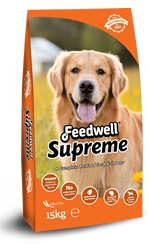 Active Family Dogs
Active Family Dogs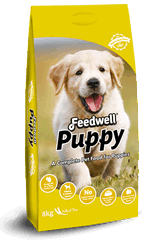 Puppy
Puppy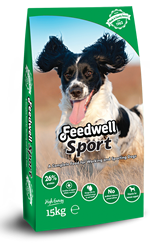 Working and Active Dogs
Working and Active Dogs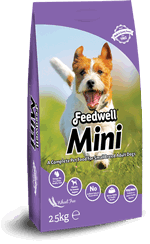 Smaller Dogs
Smaller Dogs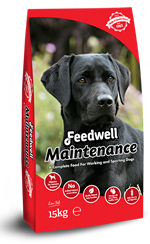 Maintenance
Maintenance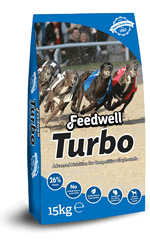 Turbo
Turbo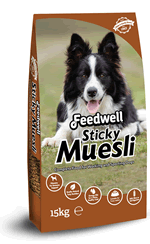 StickyMuesli
StickyMuesli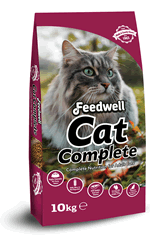 Complete Cat
Complete Cat



